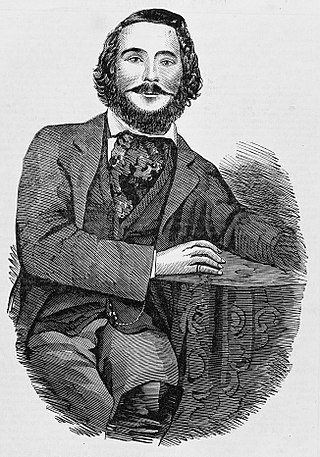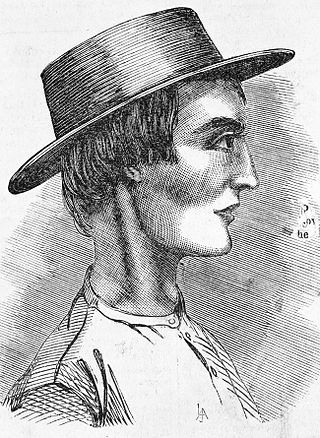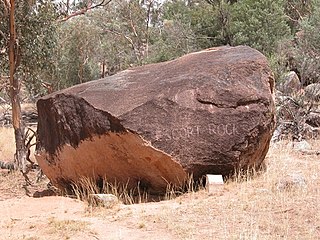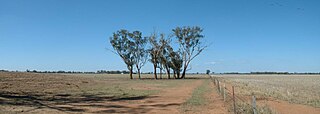Related Research Articles

Bushrangers were armed robbers and outlaws who resided in the Australian bush between the 1780s and the early 20th century. The original use of the term dates back to the early years of the British colonisation of Australia, and applied to transported convicts who had escaped into the bush to hide from the authorities. By the 1820s, the term had evolved to refer to those who took up "robbery under arms" as a way of life, using the bush as their base.

Johnny Gilbert was an Australian bushranger who was shot dead by the police at the age of 23 near Binalong, New South Wales on 13 May 1865.

Ben Hall was an Australian bushranger and leading member of the Gardiner–Hall gang. He and his associates carried out many raids across New South Wales, from Bathurst to Forbes, south to Gundagai and east to Goulburn. Unlike many bushrangers of the era, Hall was not directly responsible for any deaths, although several of his associates were. He was shot dead by police in May 1865 at Goobang Creek. The police claimed that they were acting under the protection of the Felons Apprehension Act 1865, which allowed any bushranger who had been specifically named under the terms of the Act to be shot, and killed by any person at any time without warning. At the time of Hall's death, the Act had not yet come into force, resulting in controversy over the legality of his killing.

Frank Gardiner was an Australian bushranger who became notorious for his lead role in the largest gold heist in Australian history, at Eugowra, New South Wales in June 1862. Gardiner and his gang, which included bushrangers Ben Hall, John O'Meally and John Gilbert, made off with a pile of cash and 77 kilograms of gold, worth about $10 million in modern Australian currency.
The Goobang Creek, a perennial stream of the Lachlan sub–catchment, part of the Murrumbidgee catchment of the Murray-Darling basin, is located in the Central West region of New South Wales, Australia.
"The Wild Colonial Boy" is a traditional anonymously penned Irish-Australian folk ballad that tells the story of a bushranger in early colonial Australia who dies during a gunfight with local police. Versions of the ballad give different names for the bushranger involved: some based on real individuals and some apparently fictional. A common theme is romanticisation of the bushranger's battle against colonial authority. According to a report in The Argus in November 1880, Ann Jones, the innkeeper of the Glenrowan Hotel, asked her son to sing the ballad when the Kelly gang were at her hotel in June that year.

Gary Rhett Shearston was an Australian singer-songwriter and Anglican priest. He was a leading figure of the folk music revival of the 1960s and performed traditional folk songs in an authentic style. He scored a top 10 hit in the United Kingdom in 1974 with his cover version of Cole Porter's song "I Get a Kick out of You". From the 1990s he also worked as a priest in rural New South Wales.

John Dunn was an Australian bushranger. He was born at Murrumburrah near Yass in New South Wales. He was 19 years old when he was hanged in Darlinghurst Gaol. He was buried in the former Devonshire Street Cemetery in Sydney.
"Jim Jones at Botany Bay" is a traditional Australian folk ballad dating from the early 19th-century. The narrator, Jim Jones, is found guilty of poaching and sentenced to transportation to the penal colony of New South Wales. En route, his ship is attacked by pirates, but the crew holds them off. When the narrator remarks that he would rather have joined the pirates or indeed drowned at sea than gone to Botany Bay, Jones is reminded by his captors that any mischief will be met with the whip. In the final verse, Jones describes the daily drudgery and degradation of life as a convict in Australia, and dreams of joining the bushrangers and taking revenge on his floggers.

Sir Frederick William Pottinger, 2nd Baronet was a police inspector in New South Wales, Australia, who gained fame for his fight against bushrangers.

Patrick Daley, known informally as 'Patsy' Daley, was a 19th-century Australian bushranger. Daley was the younger cousin of John O’Meally, a member of Frank Gardiner’s gang of bushrangers who robbed the gold escort near Eugowra in June 1862. By early 1863 Patsy Daley had joined with O’Meally and Ben Hall in a series of robberies carried out in the Young district. Daley was captured in March 1863 and sentenced to fifteen years hard labour. He was released in 1873. Daley married and settled in the Cobar district, becoming a successful businessman and hotel-owner.

The Gardiner–Hall Gang was an informal group of bushrangers who roamed the central west of the Colony of New South Wales, Australia in the 1860s. Named after leaders Frank Gardiner and Ben Hall, the gang was involved in numerous shootouts and robberies, including Australia's largest ever gold robbery, at Eugowra Rocks. The gang formed in 1861 and its demise came with the execution of John Dunn in 1866.
Ben Hall is a 1975 Australian TV series based on the bush ranger Ben Hall. It stars Jon Finch as Ben Hall, Evin Crowley as Biddy Hall, John Castle as bushranger Frank Gardiner, Brian Blain as Sir Frederick Pottinger, Jack Charles as Billy Dargin and John Orcsik as John Gilbert. Neil McCallum was the creator-producer and the series editor was Colin Free.

John Vane was an Australian bushranger who joined with the John Gilbert's gang for a short period during 1863. He rode with Gilbert, Ben Hall, John O’Meally and his friend Mick Burke, all of whom eventually met violent deaths. Burke, who had been Vane's childhood friend, died in a violent gun-fight at 'Dunn's Plains', near Rockley. Vane managed to avoid the fate of his companions when he gave himself up. In 1905 Vane collaborated with author and newspaper editor, Charles White, in recording his recollections of the period he spent as part of the bushranging gangs led by Gilbert, Hall and O’Meally. Vane’s biography, edited by White, was published in 1908.

The Legend of Ben Hall is a 2016 Australian bushranger film. Written and directed by Matthew Holmes, it is based on the exploits of bushranger Ben Hall and his gang. The film stars Jack Martin in the title role, Jamie Coffa as John Gilbert, and William Lee as John Dunn.

John O'Meally, known informally as 'Jack' O'Meally, was an Australia bushranger. He was recruited to join the Gardiner–Hall gang to carry out the gold escort robbery near Eugowra in June 1862, Australia's largest gold theft. O'Meally became a member of the group of bushrangers led by Johnny Gilbert and Ben Hall, which committed many robberies in the central west of New South Wales. Considered to be the most violent and hot-headed of the group, O'Meally was probably responsible for two murders during this time. The gang managed to evade the police for long periods and became the most notorious of the bushranging gangs of the 1860s. Jack O'Meally was shot and killed during an attack on the 'Goimbla' station homestead in November 1863.

Escort Rock is a heritage-listed geological formation at Escort Way, Eugowra, Cabonne Shire, New South Wales, Australia. It is one of a group of historic sites labelled the Ben Hall Sites for their association with bushranger Ben Hall, along with Ben Hall's Death Site, the Bushranger Hotel, Cliefden, the Grave of Ben Hall and Wandi. It was added to the New South Wales State Heritage Register on 8 October 2010.
Bushranger Hotel is a heritage-listed hotel located at 24 Church Street, Collector, in the Southern Tablelands region of New South Wales, Australia. It is one of a group of historic sites labelled the Ben Hall Sites for their association with bushranger Ben Hall, along with Ben Hall's Death Site, Cliefden, Escort Rock, the Grave of Ben Hall and Wandi. It was built from 1860 to 1861. It is also known as Kimberley's Commercial Hotel and Kimberley's Inn. It was added to the New South Wales State Heritage Register on 8 October 2010.

The Grave of Ben Hall is a heritage-listed headstone of bushranger Ben Hall at Forbes Cemetery, Bogan Gate Road, Forbes, Forbes Shire, New South Wales, Australia. It is one of a group of historic sites labelled the Ben Hall Sites for their association with bushranger Ben Hall, along with Ben Hall's Death Site, the Bushranger Hotel, Cliefden, Escort Rock and Wandi. It is also known as Ben Hall's Grave. The property is owned by Forbes Shire Council. It was added to the New South Wales State Heritage Register on 8 October 2010.

Ben Hall's Death Site is a heritage-listed site at Billabong Creek, Ben Halls Road, Forbes, Forbes Shire, New South Wales, Australia. It is one of a group of historic sites labelled the Ben Hall Sites for their association with bushranger Ben Hall, along with the Bushranger Hotel, Cliefden, Escort Rock, the Grave of Ben Hall and Wandi. It is also known as Blowclear Pastoral Run and Ben Hall's Place. It was added to the New South Wales State Heritage Register on 8 October 2010.
References
- ↑ "Weddings Parties Anything discography". Musicmoz. Retrieved 2 October 2008.
- ↑ "Streets of Forbes / The Death of Ben Hall (Roud 20764)". mainlynorfolk.info.
- ↑ Nimmervoll, Ed. "Paul Kelly". Howlspace – The Living History of Our Music (Ed Nimmervoll). Archived from the original on 26 July 2012. Retrieved 24 January 2014.
- ↑ Horsburgh, Susan (4 June 2007). "Song lines". The Sydney Morning Herald . Retrieved 17 August 2008.
- ↑ "Only Love Survives". Gary Shearston. Retrieved 2 October 2008.
- ↑ "Streets of Forbes". Sheet music plus. Retrieved 2 October 2008.
- ↑ "Ben Hall and the outlawed bushrangers". Department of Water, Heritage and the Arts. Retrieved 2 October 2008.
- ↑ ""Prad" - Grose 1811 Dictionary". From Old Books. Retrieved 2 October 2008.